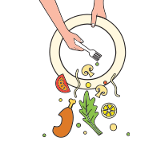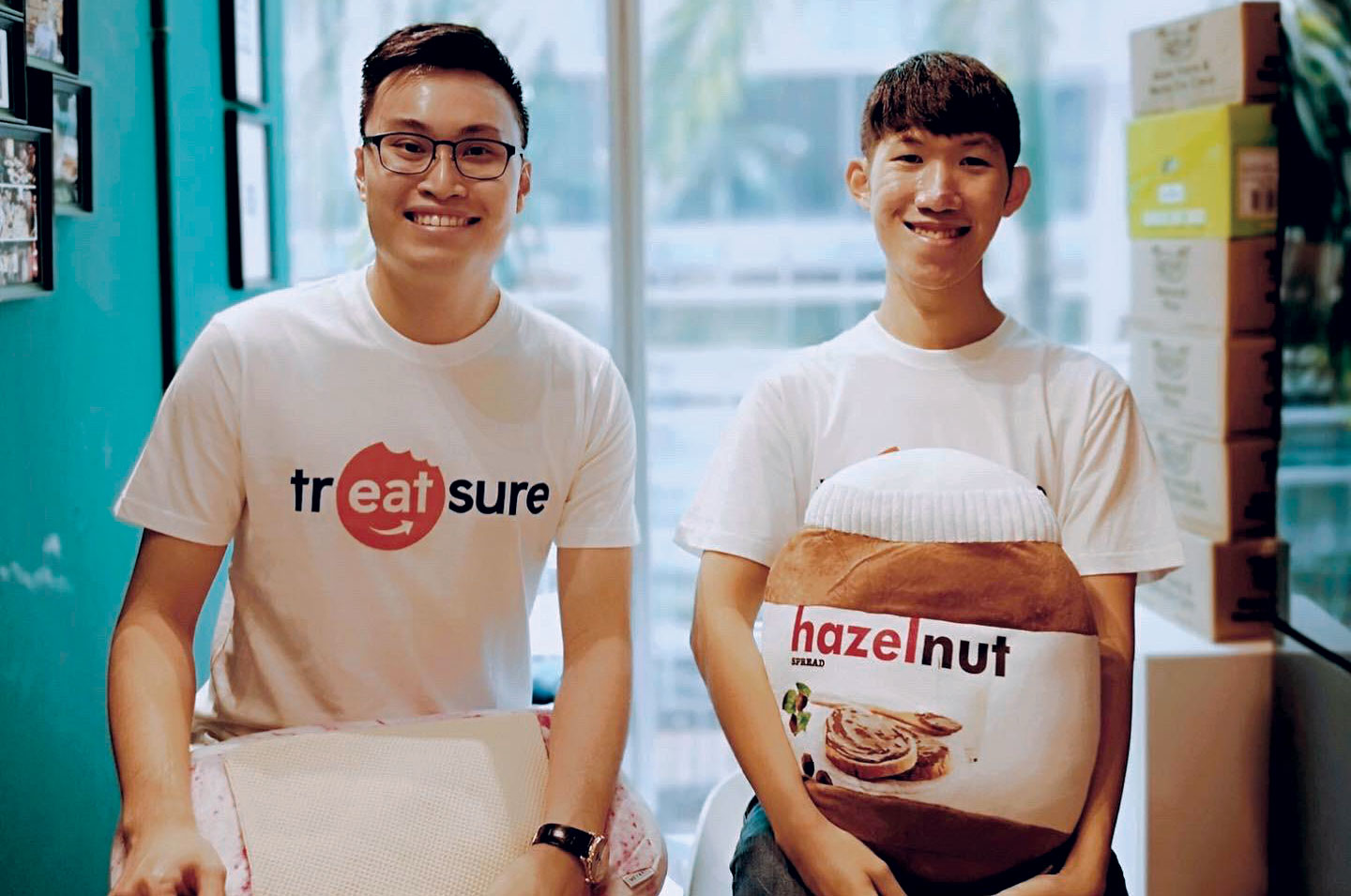The Hero of ‘Zero’
Mr Preston Wong (Business ’13 + Law ’16) is tapping on tech to turn the tide against food waste.
WHO HE IS
Mr Preston Wong champions the use of tech to solve everyday problems. His interest in the way societies operate led him to take up a postgraduate law programme. Besides his entrepreneurial ventures, Mr Wong is also an Adjunct Faculty member at the Singapore Management University, where he teaches sustainability law. He plans to return to NUS this fall, where he will enrol in a Master of Science in Environmental Management at the College of Design and Engineering.
Singaporeans cannot turn down a good deal — and for the foodies among us, nothing beats a chance to score food from a hotel buffet for less. That’s precisely what the 30,000 users of treatsure enjoy every day. The app, developed by Mr Preston Wong together with Mr Kenneth Ham (Computing ’17), allows users to take food home from hotel buffet restaurants up to an hour before closing time — food that would otherwise go straight to the waste bins. treatsure fills a growing need to tackle food waste in Singapore, which, according to Mr Wong, is on the rise again after a noted decline in 2020 (over 2019) because of COVID-19-related restrictions.

The total amount of food waste generated in 2021 was 817,000 tonnes, 23% more than the 665,000 tonnes generated in 2020.
Source: National Environment Agency
RECIPE FOR SUCCESS
The spark for treatsure was ignited at home in 2016, when Mr Wong noticed older family members regularly clearing out the fridge. “Granted, the food they were throwing was usually expired but it got me thinking whether there could have been a way to salvage these items by redistributing them within the community,” recalls the 33-year-old. Mr Wong was able to test this idea during 1-on-1 conversations with alumni from the F&B industry with the help of the NUS Business School Global Alumni Network Office (GANO), where he learnt that the problem did not just plague households, but the entire F&B industry. “At these engagements, major F&B players accepted there was an issue of food waste, but because the solutions were quite limited at the time, they seemed rather apathetic.” He recalls one of them using the memorable phrase “a tall order” to describe any potential fix.
These conversations stoked Mr Wong’s passion to find a solution to the problem, which he realised was a perennial one. Where did this passion for problem-solving come from? He points to the afternoons and evenings spent at NUS Enterprise, the entrepreneurial arm of the University, where he attended workshops, pitches and fireside chats with founders and investors on entrepreneurship and problem-solving. Here, he would listen to other entrepreneurs who had come before him, some of them seniors from his time in school. “Start-ups like ShopBack and Carousell had just taken off and their success was a real inspiration for juniors like us.”
But all the while, Mr Wong was determined to start an enterprise for a social good. Pressed to explain this conviction, he says, “I think a social enterprise is a wonderful thing: it allows you to give back to society while creating value at the same time.” Guided by this ethos, he decided to focus his efforts on food sustainability, an area which had just begun to capture the public’s attention at that point. “There was a gap in the market for a business that was founded on sustainability… and as they teach all entrepreneurs, where there is a gap, you try to fill it.” But he knew it wasn’t a gap he could fill alone. “So I spoke to Kenneth, who was the closest Computer Science person that I knew. I roped him in and started picking his brains about how we could tap on tech to cut food waste,” he says. “I really knew very little about tech at that point, so his experience and inputs were invaluable. Together, we were still in school when we created a minimum viable product (MVP).”
![]()
I think a social enterprise is a wonderful thing: it allows you to give back to society while creating value at the same time.
FROM MVP TO THE MASSES
That early iteration of treatsure caught the attention of investors and the industry. The app, which uses e-commerce technology to match buyers and sellers, has attracted more than 50 partners including hotels, restaurants and grocery stores to its network. Together, they peddle their excess food, imperfect goods (in terms of appearance or packaging defects) — which are usually rejected by supermarkets — and soon-to-expire produce to users. Besides its early incubator NUS Enterprise, treatsure has been supported by Unilever Foundry, DBS Foundation, Quest Ventures and raiSE, and is looking to further scale its business and social impact in the days ahead.
 CHEW ON THIS
CHEW ON THIS
Fast facts about treatsure
- 50 partners make up treatsure’s network: they include restaurants, hotels, F&B conglomerates, fresh food retailers and also grocery distributors.
- treatsure boasts more than 30,000 users/sign-ups
- As CEO of treatsure, Mr Wong leads a team of five, who dabble in business, tech and day-to-day operations
- Its diversified nature allowed it to survive COVID-19: its grocery arm picked up pace before the pandemic, allowing treatsure to cushion its losses when the pandemic brought the hotel buffet scene to its knees.
 Mr Wong (right) with treatsure co-founder Mr Kenneth Ham.
Mr Wong (right) with treatsure co-founder Mr Kenneth Ham.
Demand and sales for treatsure’s surplus groceries have tripled from the period before the circuit-breaker was implemented in April 2020, showing Singaporeans’ increasing willingness to support sustainability ventures. Users can purchase surplus groceries directly through the treatsure app. They have the option of having it delivered or collecting it at no cost at treatsure’s physical store located in the heart of the Central Business District. This store is the latest evolution by treatsure, which, like other start-ups, is always on the lookout for new growth paths. Billed as Singapore’s first online-to-offline surplus grocery outlet, it showcases a range of treatsure’s existing surplus groceries, which users continue to purchase. “The store is one way we can expose our community to other aspects of sustainability,” explains Mr Wong. “So we showcase eco-friendly alternatives to everyday products like furniture, getting people to rethink the extent of sustainability.”
An example he cites is a bowl that has been upcycled from coconut. “Even though it’s not a food product, we still stock it and share it with our community,” he says. “It’s all about advocating for sustainability in everything that we do.” That principle has led to treatsure’s research and development efforts. “When we started, converting food waste into more useful products like fertiliser and fuel were the standard. But tech had not really caught on in the food waste story — we were part of the digital wave and we want to be frontrunners of the next wave — the data wave.” He hopes to ride on this to study food waste and consumption patterns to nip the perennial problem in the bud. Given his success in just five years, we expect Mr Wong to be at the front and centre of these efforts.
Text by Roy Sim. Main photo of Mr Preston Wong: NUS Development Office.